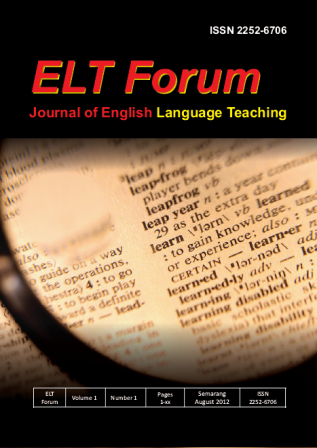Analysis of Character Education Aspects in Narrative Texts of the Electronic Textbook “Developing English Competencies”
Abstract
The issue of character education has mushroomed recently as many as social problems in Indonesia. Thus, character education should be taken into consideration in teaching and learning activity. The aim of this study is to identify the character education aspects in narrative texts found in the electronic textbook used for senior high school students grade XI entitled Developing English Competencies based on the eighteen character education aspects mandated by the Ministry of National Education.
This research applies descriptive qualitative method. In collecting the data, the writer used documentary method. The research instrument used in this study was documentation protocol and check list. The result of this research shows that there are 301 sentences from 605 sentences found in all the narrative texts which contain the character education aspects. So the percentage is 49,75 %. The sentences in the 17 narrative texts are relevant to the eighteen character education aspects.
References
Abourjilie, Charlie. 2002. Character Education Informational Handbook and Guide. Public Schools of North Carolina. Available at: www.ncpublicschools.org [accessed 06/01/13]
Anderson, Mark and Kathy Anderson. 1997. Text Types in English 2. South Yarra: Macmillan Education Australia PTY Ltd.
Arikunto, Suharsimi. 2010. Prosedur Penelitian : Suatu Pendekatan Praktik. Jakarta: PT. Rineka Cipta.
Battistich, Victor. (n.d.) Character Education, Prevention, and Positive Youth Development. St. Louis: University of Missouri. Available at: www.character.org [accessed 06/01/13]
Berkowitz, Marvin W. 2011. Understanding Effective Character Education. St. Louis: CSEE Connections the Center for Spiritual and Ethical Education.
Berkowitz, Marvin W. and Melinda C. Bier. 2005. What Works in Character Education: a Research-driven Guide for Educators. Missouri: Character Education Partnership.
Lier, Leo Van. 1996. Interaction in the Language Curriculum; Awareness, Autonomy, and Authenticity. England: Longman.
Lickona, Thomas. 1991. Educating for Character: How Our Schools can Teach Respect and Responsibility. New York: Bantam Books.
Lickona, Thomas. 2007. Smart and Good Schools. In Education Week volume 27 issue 12 pages 31-40. New York: Lawrence Erlbaum Associates.
Ministry of National Development Planning. 2010. The National Medium-Term Development Plan (RPJMN) 2010-2014. Jakarta: Ministry of National Development Planning.
Mujiyanto, Yanuarius. 2007. Petunjuk Penulisan Skripsi. Semarang: UNNES Press.
Permatasari, Riana. 2012. The Critical Thinking Tasks Displayed in the Textbooks for Eleventh Grade Students of Senior High School. Final Project. English Department FBS Unnes.



_.jpg)
_.jpg)




